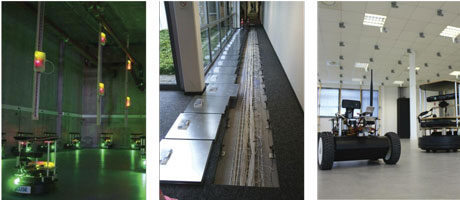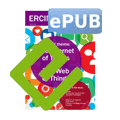by Eric Fleury, Nathalie Mitton, Thomas Noël and Cedric Adjih
The universal proliferation of intelligent objects is making Internet of Things (IoT) a reality; to operate on a large scale it will critically rely on new, seamless, forms of communications. But how can innovations be validated in a controlled environment, before being massively deployed into the real world? FIT IoT-LAB addresses this challenge by offering a unique open first class service to all IoT developers, researchers, integrators and developers: a large-scale experimental testbed allowing design, development, deployment and testing of innovative IoT applications, in order to test the future and make it safe.
IoT is not simply emerging as a major technology trend: it is already a reality with billions of existing devices. The Internet of Things represents a tremendous paradigm shift since Internet was designed; an evolution from pure end-to-end communication between an end-user device and a server in the Internet, to an Internet interconnecting physical objects that are freely able to communicate with each other and with humans. IoT builds on three pillars [1], related to the ability of smart objects to: (i) compute, (ii) communicate, and (iii) sense and interact with their environment.
Although IoT is already a reality, it is still maturing and waiting for its ‘iPhone moment’. Several challenges remain, in particular relating to the standardization of efficient and universal protocols, and to the design and testing of IoT services and applications. Owing to their massively distributed nature, their design, implementation, and evaluation are inherently complex and tend to be daunting, time-consuming tasks. Required to overcome this hurdle is a representative, large scale, platform allowing researchers, IoT designers, developers and engineers to construct, benchmark and optimize their protocols, applications and services.
The FIT IoT-LAB testbed is our answer to these challenges. It offers a first class facility with thousands of wireless nodes to evaluate and experiment very large scale wireless IoT technologies ranging from low level protocols to advanced services integrated with Internet, accelerating the advent of groundbreaking networking technologies. IoT-LAB also provides dozen of robots to test and improve the impact of the mobility of IoT devices. FIT IoT- LAB’s main and most important goal is to offer an accurate open access multi-user scientific tool to support design, development, tuning, and experimentation related to IoT.

Figure 1: FIT-IoT LAB platform. Left: Strasbourg, centre: Grenoble, right: Lille.
IoT-LAB is part of the FIT (Future Internet of Things) project which develops experimental facilities within a federated and competitive infrastructure with international visibility and a broad panel of customers. All facilities come with complementary components that enable experimentation on innovative services for academic and industrial users. FIT has received 5.8 million Euros in funding from the Equipex research grant program. The FIT consortium is coordinated by University Pierre et Marie Curie and composed of Inria, ICube laboratory from University of Strasbourg, Institut Mines-Télécom and CNRS. FIT is a platform federation. Such a federation of independent network experimental facilities is arguably the only meaningful way to achieve the required scale and representativeness for supporting Future Internet research. IoT-LAB testbeds are dispersed among six different locations across France offering access, for the first time, to 2728 wireless IoT fixed and mobile nodes equipped with various sensors (see Table 1).
| Grenoble | Lille | Paris | Rennes | Institut Télécom | Strasbourg | Total | |
| WSN430 (800MhZ) | 256 | 512 | |||||
| WSN430 (2.4GhZ) | 256 | 120 | 256 | 632 | |||
| M3 | 384 | 24 | 90 | 120 | 938 | ||
| A8 | 256 | 200 | 70 | 24 | 550 | ||
| Host Node | 32 | 96 | |||||
| Total | 928 | 640 | 344 | 256 | 160 | 400 | 2728 |
Table 1: IoT-LAB testbeds.
Users can select and reserve the number and type of nodes they wish with respect to different features, such as microcontroller (TI MSP430, ARM Cortex M3 and ARM Cortex A8), radio chip (2.4GHz or 800MHz) and additional functionalities (mobility / robots, accelerometer, magnetometer and gyrometer). Resources can be reserved on one or several sites at once. Services offered by IoT-LAB include:
- Total remote access to nodes reserved, e.g., allowing users to flash any firmware, without any condition or constraint. Any language or OS can be used to design, build, and compile applications;
- Direct access to a debugger server on each node so that all debugging can be performed remotely on the node (such as step by step code execution)
- Access to the serial ports of all nodes for a real-time interaction, with optional aggregation;
- Each node could be visible from Internet with end-to-end IP connection using IPv6 and 6LoWPAN for example;
- A very accurate power consumption monitoring of every node;
- Packet sniffer and analyzer on each node;
- A GPS module for some A8 nodes allowing a very precise end-to-end time synchronization, accurate monitoring and performance evaluation of communication protocols;
- A set of useful detailed tutorials, OS supports (Contiki, FreeRTOS, TinyOS, and RIOT) including full protocol stacks and communication libraries such as OpenWSN providing open-source implementations of IoT protocol standards;
- A unique fleet of mobile robots (WifiBot and TurtleBot).
- Strong extensibility through the availability of more than 100 empty slots on which users can physically plug their own hardware devices, while benefiting from the IoT-LAB services and monitoring tools (a feature frequently required by both academic and industrial users).
Overall, FIT-IoT LAB testbed is a unique pioneer in the domain of IoT testbeds.
Links:
IoT-LAB: https://www.iot-lab.info
FIT: https://www.fit-equipex.fr
OpenWSN: c
Reference:
[1] D. Miorandi, S. Sicari, F. D. Pellegrini, I. Chlamtac: “Internet of things: Vision, applications and research challenges”, Ad Hoc Networks, 10(7):1497 – 1516, 2012.
Please contact:
Eric Fleury
ENS de Lyon / Inria, France
Tel: +33 672 162 974
E-mail:











